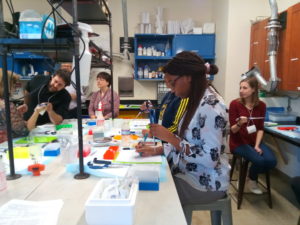 They came from schools across Greater Boston, from Littleton to Lynn, and from Cambridge to Gloucester. Nearly a dozen high school biology teachers sat in Acera’s life sciences lab for the first of three sessions in gene editing with CRISPR, using a curriculum developed and pilot-tested at Acera.
They came from schools across Greater Boston, from Littleton to Lynn, and from Cambridge to Gloucester. Nearly a dozen high school biology teachers sat in Acera’s life sciences lab for the first of three sessions in gene editing with CRISPR, using a curriculum developed and pilot-tested at Acera.
Under the tutelage of Acera’s life sciences lab manager Michael Hirsch, the cohort set up a CRISPR molecular bio assay, reviewed the basics of using a pipette, and conducted a bacterial transformation. Throughout the day, the teachers engaged in deep discussions of the gene editing curriculum.
“We talked about how to analyze results for positive CRISPR transformance, about competent cell preparation and what it means for a cell to become competent, and about bacterial transformations and its ties to homeostasis,” said Hirsch. “We also talked about CRISPR, its mechanism of action, and the ethical considerations for using gene editing technology.”
The goal of the teacher training series is to empower schools to bring this curriculum into their classrooms. To that end, the cohort also discussed the practicalities of using CRISPR in their own classrooms with students.
“There was a lot of excitement around the possibilities for this curriculum; I heard a lot of teachers talking about their students and what the students would think about this,” added Hirsch. “There’s a certain fearlessness in these teachers that I’m really happy to see.”
The series will continue with a day at Novartis’ Community Exploration and Learning Lab (CELL), where teachers will learn how scientists today work iteratively in the lab to conduct research, and how to translate these innovations into lesson plans that offer inspiration and a sense of purpose to students.


